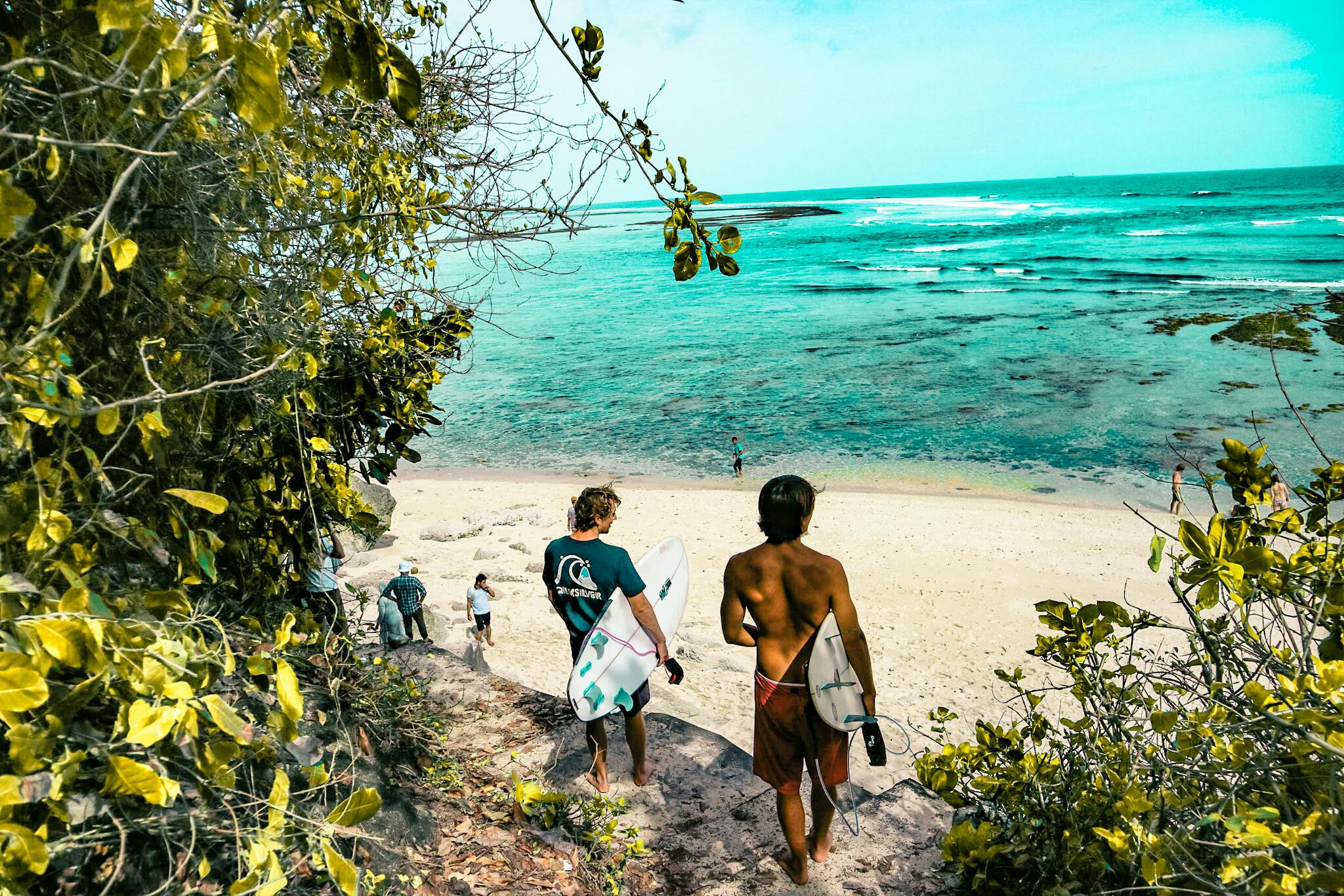- Kurangi Penggunaan Plastik
Sampah plastik adalah masalah besar di Bali. Surf camp bisa mulai dengan langkah sederhana kayak mengurangi atau bahkan menghapus penggunaan plastik sekali pakai. Contohnya, kamu bisa menyediakan botol air yang bisa diisi ulang buat tamu dan pakai sedotan yang ramah lingkungan. Langkah kecil ini bisa punya dampak besar buat lingkungan.
Kamu juga bisa pasang stasiun pengisian air di area umum, biar tamu bisa isi ulang botol mereka sendiri. Ini nggak cuma ramah lingkungan, tapi juga lebih praktis buat tamu. - Papan Surfing dan Peralatan Ramah Lingkungan
Papan surfing tradisional biasanya dibuat dari bahan yang kurang ramah lingkungan. Tapi, sekarang udah ada opsi buat pakai papan surfing yang dibuat dari bahan daur ulang atau ramah lingkungan, kayak resin berbasis tumbuhan atau foam yang bisa terurai secara alami. Menyediakan papan surfing ramah lingkungan buat disewa atau dijual bisa jadi bukti komitmen kamu terhadap keberlanjutan.
Selain papan surfing, kamu juga bisa tambahin produk lain kayak wax biodegradable atau wetsuit dari bahan daur ulang. Ini bisa ngasih sentuhan eco-friendly ke surf camp kamu. - Energi Terbarukan
Investasi di energi terbarukan, kayak panel surya, bisa bantu surf camp kamu ngurangin jejak karbon. Dengan pakai energi bersih, kamu bisa nunjukin ke tamu kalau kamu serius tentang bisnis yang ramah lingkungan. Emang, biaya awalnya mungkin agak mahal, tapi dalam jangka panjang, energi terbarukan bisa bikin biaya operasional lebih hemat.
Selain itu, kamu juga bisa terapkan sistem pengelolaan air yang efisien dan penggunaan kembali air limbah buat hal-hal kayak menyiram tanaman, biar dampaknya ke lingkungan makin kecil. - Dukung Konservasi Lokal
Salah satu cara efektif buat narik wisatawan eco-conscious adalah dengan dukung proyek konservasi lokal. Surf camp kamu bisa kerja sama dengan organisasi konservasi setempat buat jaga kebersihan pantai atau bantu pelestarian terumbu karang. Keterlibatan dalam inisiatif ini nggak cuma nunjukin komitmen terhadap lingkungan, tapi juga ngasih pengalaman bermakna buat tamu yang pengen ikut berkontribusi.
Misalnya, kamu bisa adain acara bersih-bersih pantai rutin atau jadi tuan rumah acara edukasi tentang pentingnya melestarikan lingkungan laut. Dengan libatin tamu dalam kegiatan ini, mereka bakal ngerasa jadi bagian dari sesuatu yang lebih besar selama liburan mereka.
- Gunakan Media Sosial dan Website untuk Edukasi
Media sosial adalah alat yang ampuh buat share cerita tentang inisiatif ramah lingkungan di surf camp kamu. Bagikan foto dan video tentang gimana camp kamu ngurangin plastik, dukung konservasi, atau pakai energi terbarukan. Tamu potensial yang lihat komitmen ini di Instagram, Facebook, atau YouTube bakal lebih tertarik dan merasa terhubung sama nilai-nilai yang kamu anut.
Selain media sosial, pastikan website kamu punya halaman khusus yang ngejelasin semua praktik berkelanjutan yang udah diterapin. Biarkan tamu tahu apa yang kamu lakuin buat jaga lingkungan dan gimana mereka bisa ikut berkontribusi selama nginap di camp kamu. - Kerja Sama dengan Influencer Peduli Lingkungan
Influencer marketing bisa efektif banget buat nyebarin pesan ramah lingkungan. Kerja sama dengan influencer yang fokus di eco-tourism atau sustainability bisa bantu promosiin surf camp kamu ke audiens yang tepat. Pastikan influencer tersebut beneran punya minat sama gaya hidup ramah lingkungan, biar promosi terasa autentik dan lebih dipercaya. - Tawarkan Pengalaman Eco-Friendly yang Berbeda
Buat benar-benar narik wisatawan eco-conscious, tawarkan pengalaman yang mendalam dan bermakna. Misalnya, kamu bisa bikin paket yang nggabungin les surfing, acara bersih-bersih pantai, dan kunjungan ke proyek konservasi lokal. Tamu bakal ngerasa lebih terhubung dengan lingkungan sekitar dan ninggalin kesan yang mendalam.








